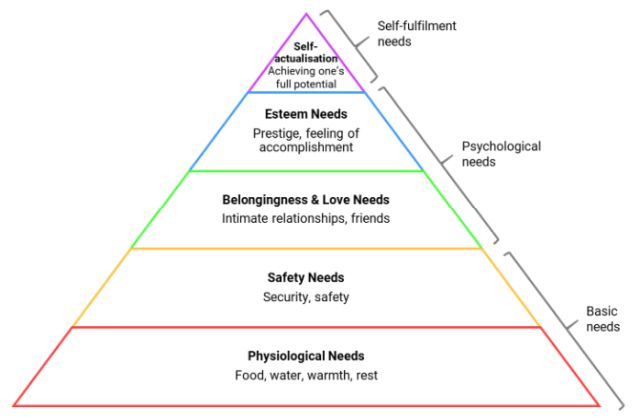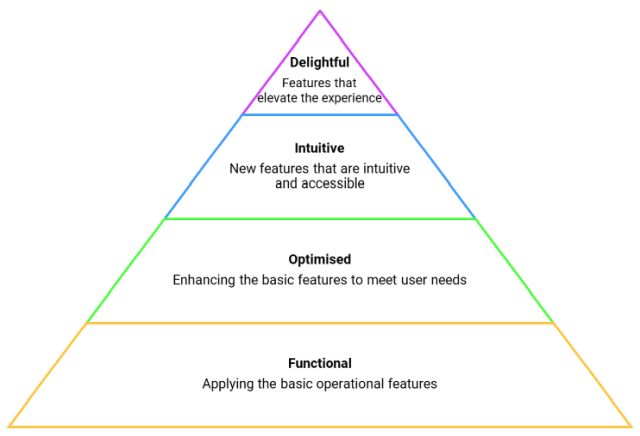It's hard to think of an idea that's been as impactful and as long-lasting as Abraham Maslow's Hierarchy of Needs. Proposed in 1943 in a paper called, "A Theory of Human Motivation", the hierarchy is intended to reflect the universal needs of people and societies. Basic survival needs at the bottom, more creative and transcendent needs at the top.

Over time a planning entropy is inevitable in any sized organisation. That is to say, projects and programs make it onto the priority list ahead of more mission-critical alternatives. This is particularly impactful when entering a general economic downturn, or when your organisation starts to notice that competitors are taking market share: some kind of refocus or reset is essential.
We have noticed that the good intentions of "focusing on the right things" can get side-tracked by a few common traps:
"Sunk Cost Fallacy"
– decision makers choose to complete a project or initiative instead of allocating resources to the top priority because so much has been invested already.
"Hi.P.P.O Thinking"
– the Highest Paid Person's Opinion wins out and a project dear to their heart (but perhaps not best at helping the bottom line or meeting the organisation's mission) is preserved or promoted.
"Aimless Enablers"
– these are technology projects that have made their way into the delivery portfolio without clearly meeting a user or business need. The danger here is that time is expended building a great technology solution without delivering any real business value.
Deriving a Digital Hierarchy of Needs
So, how do you communicate that a transition to a more focused delivery portfolio is an existential necessity? Enter our version of Maslow's Hierarchy of Needs, the 'Digital Hierarchy of Needs':

Although simple, it has proven to be a useful tool for getting senior executives onside, and align on where the focus should be first - on getting the basics right.
Functional
One of our clients was operating a site that was unreliable, and impacting trust in the brand. This was mostly due to technical debt that had been overlooked in favour of more exciting "Delightful" features. "Functional" considerations are represented by a broad spectrum of core non-functional requirements, including security. If your site is down, or your sensitive data has been compromised – your customers won't be interested in your "delightful" offerings, and your regulators won't be happy either.
Optimised
Another client needed to offer near real-time access to information to its customers in order to transact. Whilst the industry bare minimum was sub 2 seconds, Google recommends sub 0.5 seconds. The client's site would sometimes take as long as 10-14 seconds to load: totally unacceptable, even by the standards of the day. Customers and users frustrated by slow digital experiences don't linger for long or return.
Intuitive
Only once you have a site that's reliable and fast can you consider adding new features that meet basic user needs. Not only that, but these features should be intuitive and accessible. We had a long backlog of improvements to the site (CMS, payment pages, basket improvements, etc.) that had been postponed in favour of "Delightful" features.
Delightful
You should only consider "Delightful" features once you have a site that's reliable, fast, and meets your users basic needs. What are "Delightful" features? These are features that elevate your site experience beyond its core: features that drive retention, personalisation, customer advocacy, etc.
This way of driving focus is just a tool – and the real value of a tool like this is to stimulate conversations and get alignment. There are also plenty of different ways of applying these hierarchies. If, for instance, you wanted to consider multi-channel digital, you might want to place a well-functioning web-channel at the bottom (physiological) element of your new pyramid and think of really cutting-edge technologies (VR/ AR, kiosks, chatbots, etc.).
No two projects are the same - but they have one thing in common: a need for decisive, informed, and often urgent action. At AlixPartners, we help businesses rapidly modernise through our staged approach to digital transformation.
The content of this article is intended to provide a general guide to the subject matter. Specialist advice should be sought about your specific circumstances.

